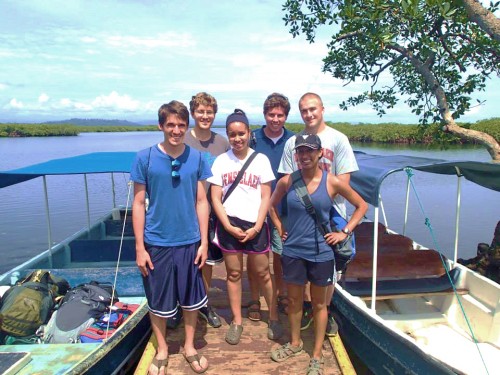 SIX MEMBERS OF RPI’S CHAPTER OF EWB STAND at the edge of Isla Popa II, the community of which they hope to help on their next trip to the area.
SIX MEMBERS OF RPI’S CHAPTER OF EWB STAND at the edge of Isla Popa II, the community of which they hope to help on their next trip to the area.Over the last several weeks, members of RPI’s chapter of Engineers Without Borders traveled to the Panamanian island community of Isla Popa II to continue progress on their clean water program. According to EWB Vice President Kammi Shah ’14, this was the team’s third trip to the island and their second assessment trip.
Shah explained that the people of Isla Popa II have experienced difficulty gathering and storing enough water to provide for themselves year-round. The climate of the area is one of the major problems the community has to deal with. “The dry season just wipes everything out,” Shah said, referring to the village’s water supply.
The islanders have attempted to gather water by using buckets and tanks to collect rainwater and groundwater. Unfortunately, the island’s dry season is not the only factor working against them. “There’s arsenic in the water,” explained Shah. She added that this comes naturally from the soil and other nearby environmental sources. “It’s not that unusual for an area near the equator,” she said.
To combat this problem, the EWB team—comprised of five RPI students and one professional mentor, David Railsback, from ARCADIS, a company that provides “consultancy, design, engineering and management services in the fields of infrastructure, water, environment, and buildings”—has developed a plan to increase the rate at which the community can collect water. One part of the project will involve installing a gutter system on one of the main community buildings in the village. The team also hopes to install a “first flush” system. That would flush out the first milliliter of water to prevent initial contaminants from infecting the rainwater.
Although the system was not installed on their most recent trip, the EWB members made some final preparations. According to Shah, they completed their measurements and visited local hardware stores to figure out prices for local materials. Shah emphasized that they wanted to make sure members of the community would be able to repair the system without assistance from the EWB team. As such, they traveled around the island to find local materials.
Despite the fact that the team received a grant for $10,000 from the School of Engineering last year and approximately $8,500 from Pratt & Whitney, funding is still an issue for the project. As a result, the team has also formed verbal contracts with the locals to determine each party’s contributions, including what each should expect from the others.
Shah said that the team hopes to return to Isla Popa II this winter to finally implement their system. Until then, the locals will use techniques and practices explained to them by the EWB team to keep their water as clean as possible without technological assistance.
For more information about the project, visit the chapter’s website at http://ewb.union.rpi.edu/ or its Facebook page at http://www.facebook.com/EWBRPI/. To contact the group about their project, e-mail the officers at ewb-officers@union.rpi.edu.
